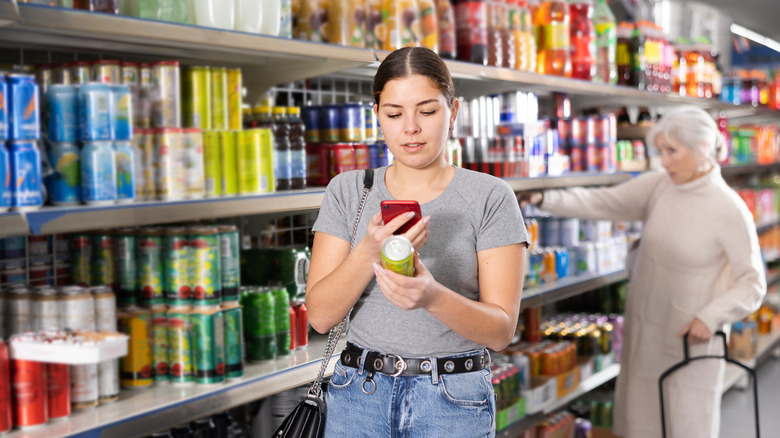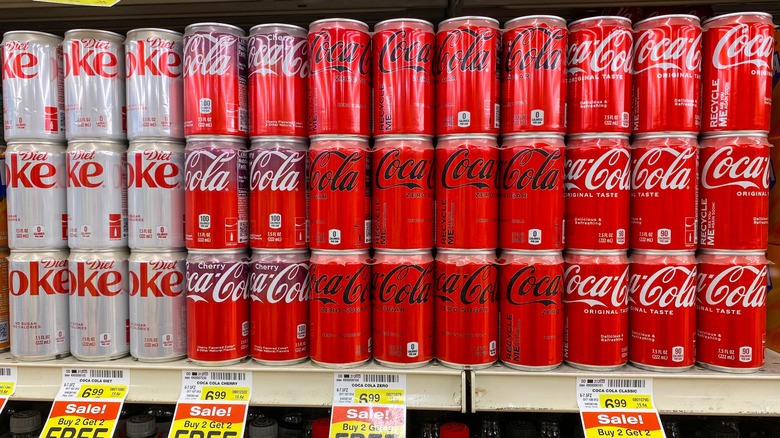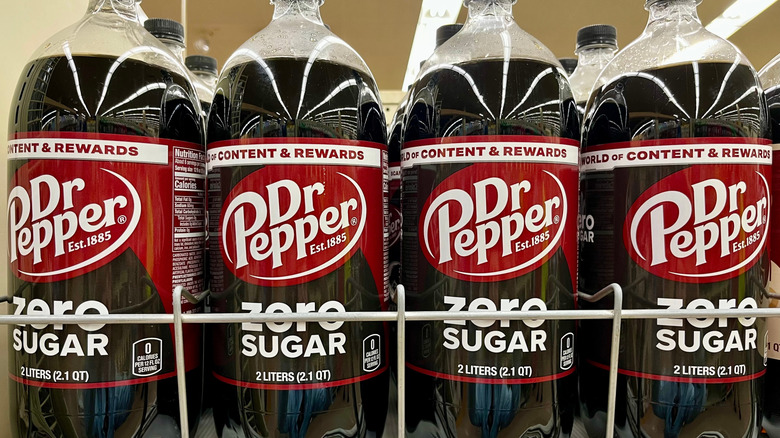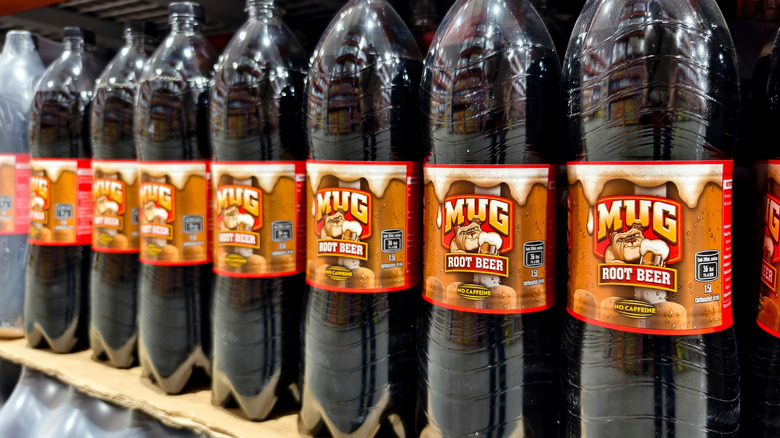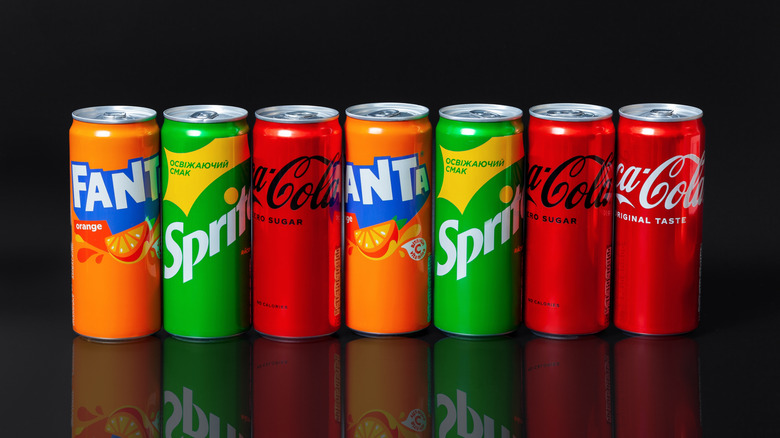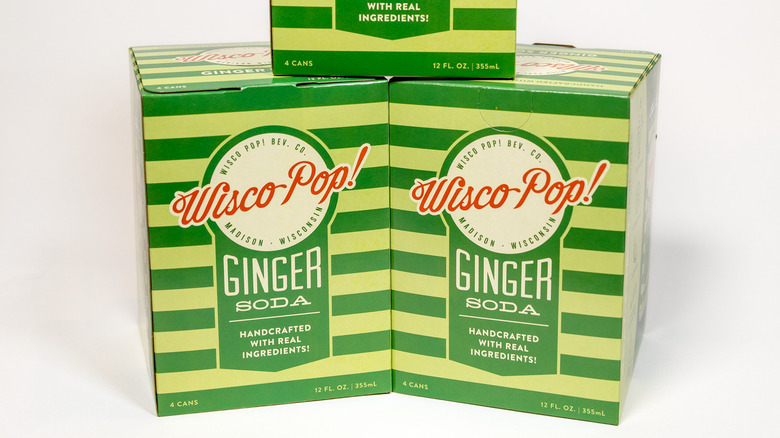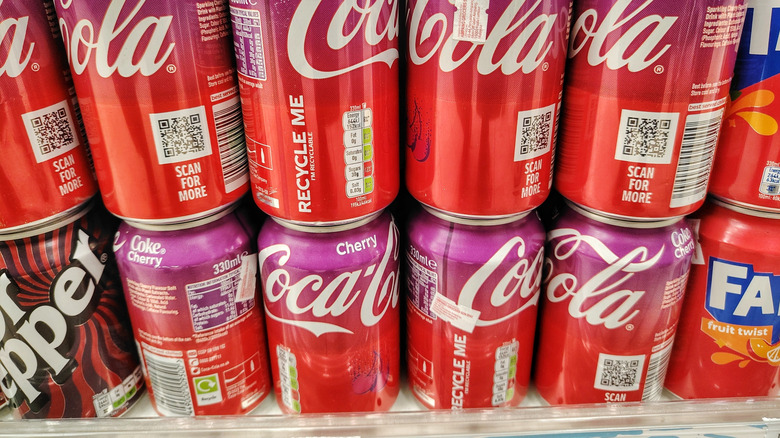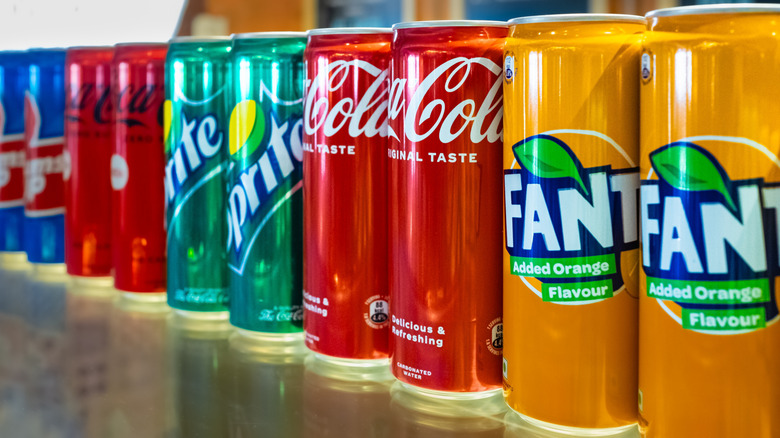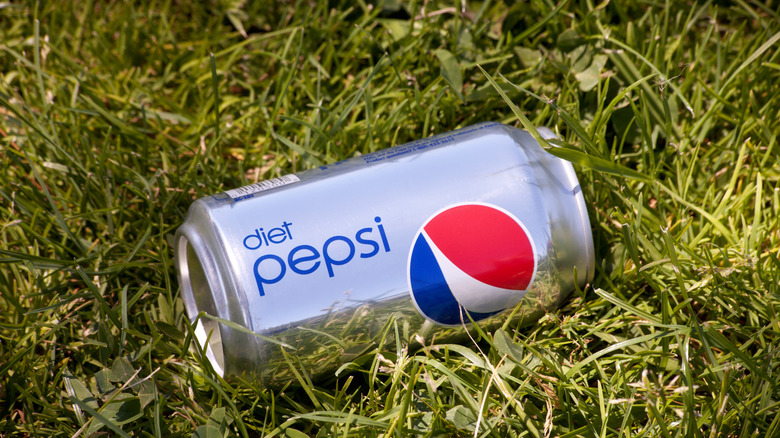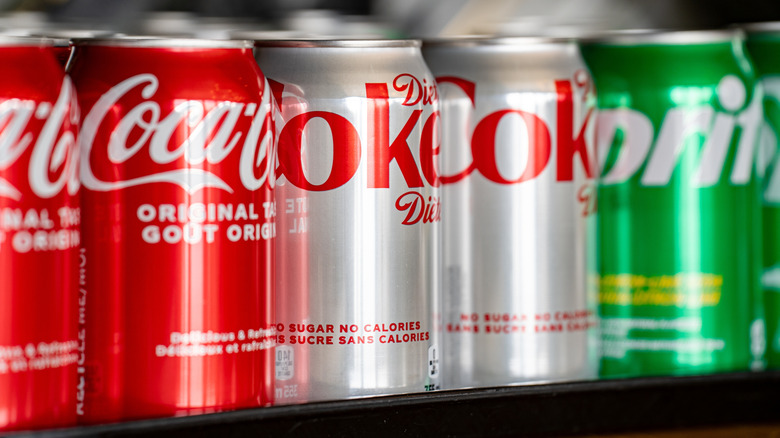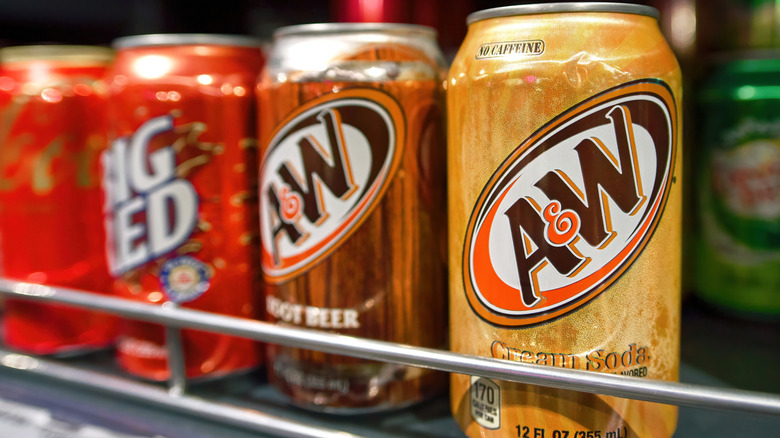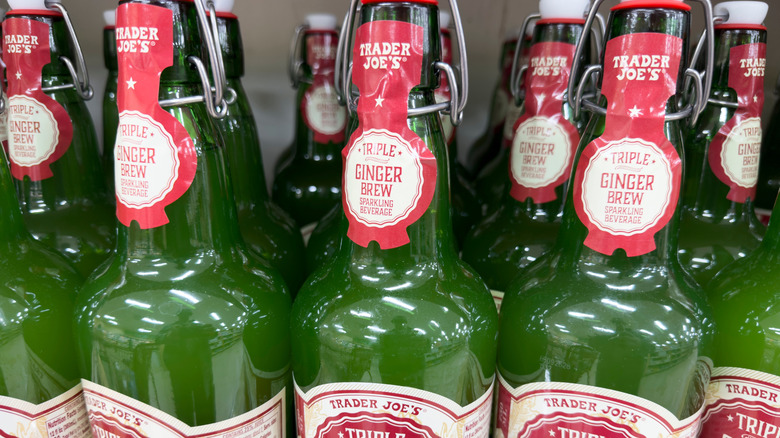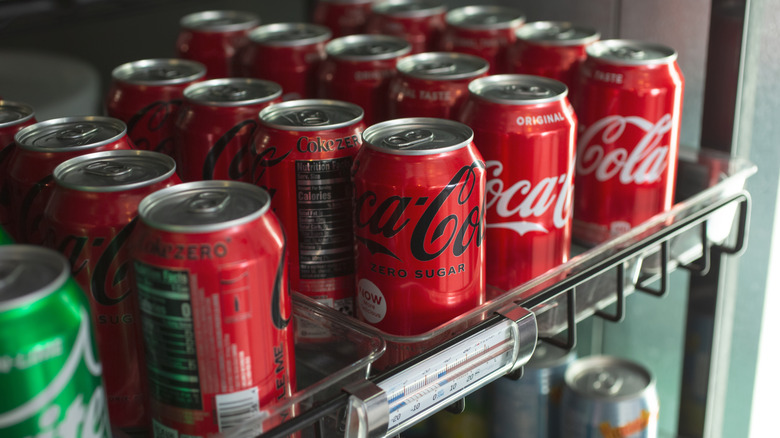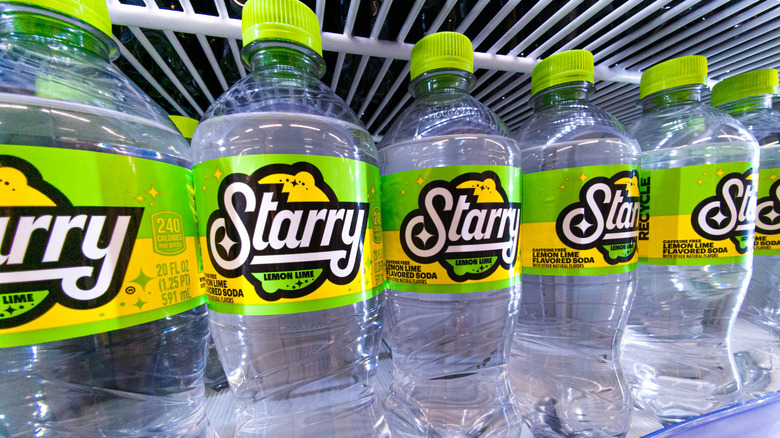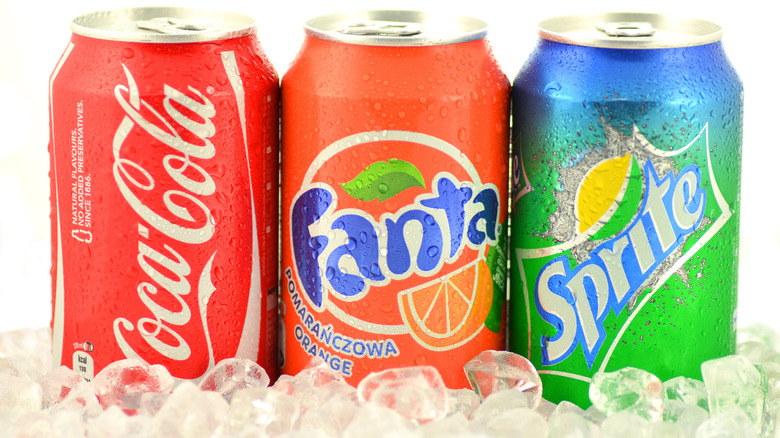14 Of The Biggest Soda Recalls In US History
Sure, it's packed with sugar and enough additives to make a chemist blush, but there's something about having a cold soda fizzing at the tip of your tongue that you just can't beat. And even if the taste's not to your liking, soda's bound to capture your imagination in lots of other ways. There's, of course, all the soda propaganda, and then there's soda's wacky pedigree — like how, up until the late 1940s, you could snag yourself a 7UP bottle doused with lithium from the grocery store (you know, for when you really need to cool down). Or that early soda makers experimented with poison like strychnine and controlled substances like morphine and heroin to give their products a jazzy health kick.
The industry's come a long way since then. It's now pretty bizarre to find soda laced with actual narcotics, poison, or prescription drugs. But even then, soda's still a frequent caller on the FDA's recall list. From cans that were actual laceration risks to others that — while branded as sugar-free — inexplicably ended up containing sugar, soda's been pulled from the shelves for all manner of reasons. Here's a roundup of some of the worst.
Coca-Cola Original Taste (2025)
Plastic: As abundant as the fish in the sea — or more so, if recent projections are anything to go by. And it's not just the oceans choking on it anymore. Scientists have found microplastics in our hearts, brains, livers, and even bloodstreams. At this point, it's just easier to consider taking in bits of plastic a natural outgrowth of living. Even inane activities like reheating your food in the microwave and drinking from plastic water bottles in the summertime will still sneak microplastics into your body.
Trusting store-bought products might not save you, either. Plastic contamination is a pretty common occurrence in the food industry, with brands across the board — from Trader Joe's with soup dumplings in 2024 to Jonhsonville LLC with pork links in 2023 — having to issue massive recalls due to plastic contamination. Joining the ranks in 2025 was Coca-Cola, which ended up pulling 10,368 cans of Coca-Cola Original Taste from retail stores in Wisconsin and Illinois after they were found to be adulterated with plastic.
The FDA designated the recall Class II, meaning that consuming the products posed only a minimal risk of serious adverse events or long-term health complications. That notwithstanding, chewing through bits of plastic large enough to necessitate a recall is still risky.
Dr. Pepper Zero Sugar (2025)
Hard as it may be to believe, there was a time when sugar was soda's main selling point — so much so that marketing campaigns were packed with squeaky-clean, all-American types getting quick energy bursts after just one sip of soda. The tables began turning somewhere around the 1950s, and with scientists continually finding links between sugar and lifestyle diseases like diabetes and heart disease, full-sugar soda quickly began falling out of favor among certain demographics.
Big soda was quick on the uptake, though, introducing diet soda (later rebranded as zero sugar) to zero in on health-conscious shoppers, while keeping full-sugar staples in rotation for everyone else. Sound pretty ingenious, until a mix-up happens and full sugar soda ends up on a store shelf bearing a zero sugar label. This is exactly what happened to Jacksonville-based Pepsi Beverages Company, which found itself recalling 19,203 cans of Dr. Pepper Zero Sugar from three states after discovering that the cans actually contained full sugar Dr. Pepper. The mix-up might have been pretty immaterial for most shoppers, but not for the estimated 38.4 million Americans with diabetes who need to keep a tight lid on blood sugar levels to avoid hyperglycemia, which can cause fatigue, vision problems, and even coma in severe cases.
PepsiCo Mug Root Beer (2024)
Sure, there are plenty of root beer options out there, but if you're looking for an easily accessible option, PepsiCo's Mug Root Beer's got you covered. To sweeten the deal (or perhaps not), PepsiCo even makes a zero-sugar variant for the sugar-conscious shopper.
Though the brand ought to really tighten up on the labeling, because it yet again fell prey to a label switcheroo in 2024. This time, Mug Root Beer labeled as full-sugar turned out to be zero sugar, forcing the company to recall 3,000 gallons of the stuff from retailers in six states, including Mississippi, New Mexico, Texas, and Oklahoma. This wasn't the first time PepsiCo had recalled soda due to mislabelling. Barely two weeks prior, over 200 cases of Schweppes Zero Sugar Ginger Ale had been pulled from store shelves after they were found to contain full sugar.
Diet Coke, Fanta Orange, and Sprite (2023)
Fanta, Sprite, and Coke: Go-to options for topping off Mormon-inspired dirty soda and also Big Soda's OG trifecta. These guys have been around since forever, with Coke's pedigree dating as far back as the 1800s; back when it was still legal to put a tinge of a line of cocaine in a soft drink for "medicinal purposes."
It's now pretty rare to find something as unexpected as actual controlled substances in a can of Coke, but that doesn't mean that these cans come completely unadulterated. Foreign objects like plastic, stones, metal, wood, and even glass can sometimes sneak into these drinks, necessitating massive recalls.
This is exactly what happened in 2023, when Coca-Cola discovered foreign material in cans of Diet Coke, Sprite, and Fanta Orange manufactured by Alabama-based United Packers. As a result, 2,000 cases of the stuff were recalled from stores across Florida, Mississippi, and Alabama. Though details pertaining the size and nature of the foreign object remained undisclosed, its risk potential was presumably limited, considering that the FDA designated the recall Class II.
Wisco Pop! Soda (2022)
If you've ever tried to make homemade bread, then you're probably pretty familiar with the mechanics of yeast. Yeast consumes the sugar in the dough, releasing carbon dioxide, which creates air pockets within the dough — and tada, you've got a fluffy loaf.
The same mechanics apply if you opt for other fermentable substances. Be careful not to vacuum seal something that's actively fermenting, though, because you'll essentially have created a bomb; not exactly weapon-grade, but still pretty explosive. And if you're just itching to know what that's like in practice, just ask any of the people who bought Wisco Pop! Soda in 2022.
These folks didn't even have to crack open their cans to get a satisfying pop; they just burst open, all by their lonesome. As it turned out, wild yeast had somehow snuck into the cans, fermenting the sugary drink therein and accumulating so much carbon dioxide that it surpassed the limited capacity of the can. A handful of customers who purchased the product reported cans getting unusually warm and then bursting open. As a result, Wisco Pop! was forced to pull its entire production line of soda spanning four categories, including cherry, grapefruit, and ginger from store shelves.
Cherry Coca-Cola Zero Sugar (2022)
Aspartame's long-standing cachet has been tainted by research linking it to cancer, neurodegenerative disorders, and metabolic disruption. Even without those alarming findings, aspartame is not completely safe for the fraction of the population living with phenylketonuria; a condition that impairs the body's ability to break down phenylalanine, one of the three chemicals produced when aspartame is digested.
That's why soda brands are legally bound to declare phenylalanine on the labels of products sweetened with aspartame; and why Coca-Cola found itself recalling 13,805 cases of Cherry Coca-Cola Zero Sugar from 159 retail locations across California due to undeclared phenylalanine. Undeclared phenylalanine is reason enough for a recall, but it wasn't the products' only fault. A handful of the cans had also been mislabeled as Cherry Coca-Cola; the full-sugar version of Cherry Coca-Cola Zero Sugar.
Coca-Cola (2018)
Soda cans are a pretty strange invention if you really think about it. They're beveled at the bottom, and lately, a lot of them are mysteriously losing girth; what gives? Opening them is also a bit of a trial; half of them seem rigged to explode and douse you with soda the moment you pull the tab. But even with all that strangeness, one thing you don't expect is for your soda can to actively try to injure you.
Better watch out, though. Cracking open a soda can isn't always the low-risk activity it's cracked up to be. Seems a bit alarmist, but not completely far-fetched. At least, not in 2018, when Coca-Cola recalled 766,271 cases of soda cans spanning multiple categories, including Diet Coke, Sprite, Dr. Pepper, Fanta, and Barq's Root Beer, from retailers across six states, including Arkansas, Illinois, Iowa, and Nebraska, after discovering that they posed a severe laceration risk. Coca-Cola disclosed that a defect in the manufacturing process had resulted in cans with unusually sharp lids, meaning that folks who bought these cans could've gotten anything from a nick to a blood-gushing gash; depending on how aggressively they chose to open the cans.
Diet Pepsi and Diet Pepsi Caffeine Free (2018)
Diet sodas have seen a revolving door of artificial sweeteners since they hit the mainstream in the '60s. Before aspartame came to rule the roost, there was saccharin; a sweetener once lauded for being 300 to 400 times sweeter than sugar, but later lost traction following a string of health controversies. Then came aspartame, which, while not toting quite as much sweetness as saccharin, didn't have the harsh iron-esque aftertaste and, at the time, had no known links to cancer. Notwithstanding more recent research, the FDA still deems aspartame safe; as long as it's consumed within acceptable thresholds.
But while regulators haven't banned the stuff outright, they do require companies to declare it on product packaging to ward off consumers with personal or health-related reservations. Obviously, said declarations shouldn't be confusing enough to leave shoppers guessing whether the product contains aspartame or not. But that's pretty much what happened at PepsiCo in March 2024: A packaging error resulted in Diet Pepsi Caffeine Free cans correctly labeled as containing aspartame on the primary packaging, but mislabeled as aspartame-free on the outer packaging. Consequently, PepsiCo voluntarily pulled 194 cases of the product from retail shelves across Connecticut, Maine, Rhode Island, and Massachusetts.
Coke, Dr. Pepper, Diet Coke, and Sprite (2016)
Canning has come a long way since it revolutionized the seafood industry in the early 1800s. Now, pretty much anything can come in a can: Vegetables, pasta, milk, stew, even soup. But, obviously, the earliest beverage to hop on the trend was soda, which had already started showing up in aluminum cans as early as the 1960s. And while canning has many appeals — portability, stack-ability, mass consumer appeal — it's still a finicky process; things can and do go wrong. Some cans burst open at the earliest convenience, while others can genuinely injure you under the right circumstances.
Coca-Cola has weathered a number of these mishaps, a mild version of which happened in 2016, when a production error resulted in cans with a tab that, instead of pushing downward, opened outward, making a loud pop sound. A total of 14,168 cases of Coke, Dr. Pepper, Diet Coke, and Sprite, distributed to stores across Arizona, Oregon, and Washington, were affected, which meant that they all had to be pulled from circulation.
A&W Cream Soda (2016)
Finding a caffeine-free soft drink can be an uphill battle in a world where even decaf coffee has caffeine in it. Scientists say that over 60% of the soft drinks you encounter on grocery store shelves have caffeine in them. You might not taste it, but it's there — just lurking behind all the sugar and artificial flavors. That's where Chesterman Co.'s A&W cream soda comes in: still toting that satisfying fizz you'd get from regular carbonated soda, but without the need to chance getting accidentally wired from caffeine.
But it's likely best to take all that with a grain of salt. A&W does have a bit of a reputation with false marketing claims. Remember when they were sued for claiming that their root beer and cream sodas were "made with aged vanilla" when they were in fact made with run-of-the-mill artificial vanilla? Well, something almost identical happened in 2016, when A&W cream soda — famously touted as caffeine-free — ended up on the recall list for containing caffeine. However, unlike the vanilla debacle, this didn't appear to be an attempt to mislead consumers, as the company voluntarily recalled 24,240 bottles of the mislabeled cream soda from retail stores across multiple states, including Arkansas, Iowa, Minnesota, Oklahoma, South Dakota, and Tennessee.
Trader Joe's Triple Ginger Brew (2015)
Trader Joe's is famous for many things: That Two-Buck Chuck wine that curiously sells for a little over a dollar (though it's not the only bargain wine at TJ's), and routinely running out of stock of things you desperately want. Pro tip for sidestepping the hoarders: Call ahead and ask very, very nicely for an employee to reserve something for you. Some buzzed-out Trader Joe's items are pretty much only available for about a second every year, like Frozen Kimbap, or that delectable Toscano cheese dusted with cinnamon.
But there's another reason some of your favorite Trader Joe's items disappear from the shelves: recalls. The retail giant has had to de-stock multiple items over the years for all manner of reasons; from frozen waffles and pancakes that turned out to be tainted with listeria, to broccoli cheddar soup infested with insects.
TJ's yet again found itself on the recall list in 2015, this time for an unspecified amount of its Triple Ginger Brew. This particular recall kicked off after multiple complaints from customers about bottles of the stuff exploding for no known reason. Thankfully, no injuries were reported; a near thing considering that Triple Ginger Brew comes in glass bottles, which means that an exploding bottle is bound to send shards of glass flying everywhere.
Coca-Cola Caffeine-Free (1998)
There's a reason why soda tastes way better than most other beverages: carbonation. And for that inimitable fizzy bubbliness, you can thank one of the foulest-smelling substances known to man: ammonia. Aesthetic challenges aside, there are pretty good reasons why soda companies will often lean toward ammonia for carbonation. For one, it's cheap, so pretty gentle on the bottom line. It's also infinitely scalable, since ammonia can be filtered out of the process and recycled after use. And as an added bonus, it's pretty eco-friendly if the carbon dioxide is captured and recycled back into the system.
It's not completely foolproof, though. Damaged apparatus can sometimes leak ammonia into carbonation lines, contaminating entire batches. That's about the stretch of what happened at Coca-Cola in 1998, when damaged refrigeration equipment tainted a batch of caffeine-free coke with ammonia, resulting in thousands of cans being recalled from retail stores across Indianapolis. Only four consumers reported illness — mostly nausea and stomach upset — which was a pretty close call considering that ammonia is really caustic and can cause mild to grave damage to the digestive tract when ingested.
PepsiCo Slice Lemon-Lime Soda (1986)
Anyone who's ever come down with a terrible case of food poisoning knows all too well that food can try to kill you. Some foods, like apple seeds, come already pre-equipped with poison, while others, like soda, require a bit of provocation to turn lethal. And while early soda makers sometimes tinkered with poison to presumably differentiate their products, such hijinks had long been phased out by 1986, which is why it was pretty startling when reports surfaced that cans of Slice lemon-lime soda (now called Starry) had potentially been adulterated with cyanide.
The whole thing started with what authorities suspected to be a crank call from someone claiming to have slipped an unspecified amount of cyanide into a specific lot of soda cans. PepsiCo was certain the products hadn't been tampered with, but with consumer lives at stake, the company was forced to bite the big one and recall 11,500 cases of the potentially adulterated soda.
Coca-Cola, Fanta, and Sprite (1972)
A lot of work goes into making sure these cans are completely safe for holding human food. One key process that soda makers can't avoid is coating the aluminum on the interior of the can with a resin. Else, the acidic contents of the soda react with the aluminum, causing all manner of issues. Typically, a solvent — usually an organic substance like butyl acetate, xylene, or toluene — will be used to ensure the resin is properly adhered and evenly spread onto the can. The cans are then tossed into an oven for curing, where the solvent quickly dissipates from all the heat, leaving only the resin.
However, like with any complex production process, things can go awry — which is just how Coca-Cola found itself recalling a whopping 3.2 million cans of Coca‐Cola, Fanta, and Sprite from retail stores across New York state in 1972. In this case, the solvent did not burn off due to an oven malfunction, which left the stuff just lurking on the lid. A handful of customers who purchased the products reported perceiving a foul odor similar to kerosene, which tracks because most solvents are derivatives of petroleum.

